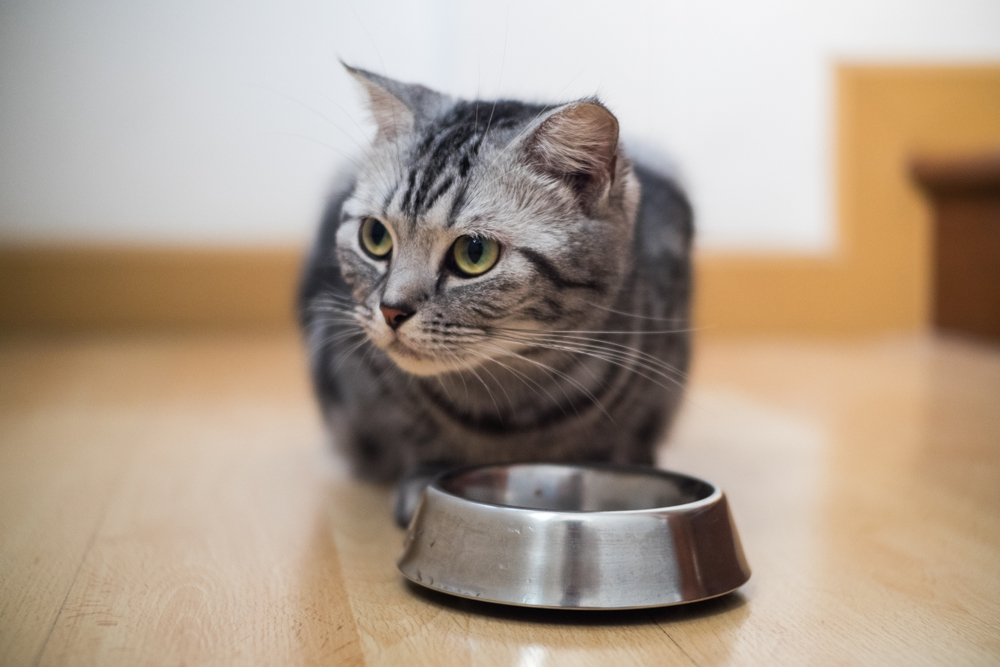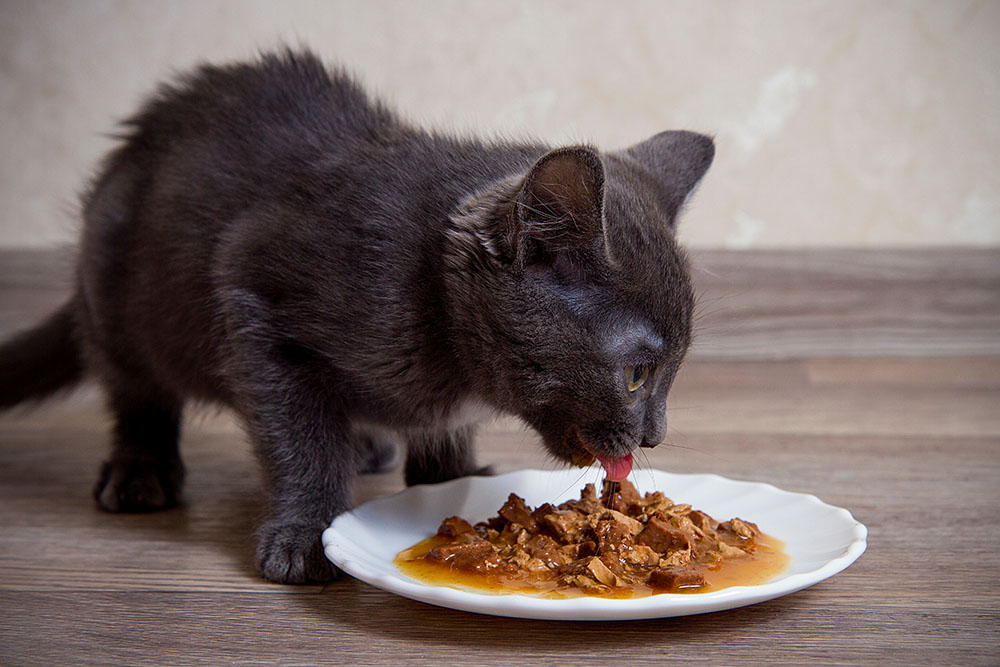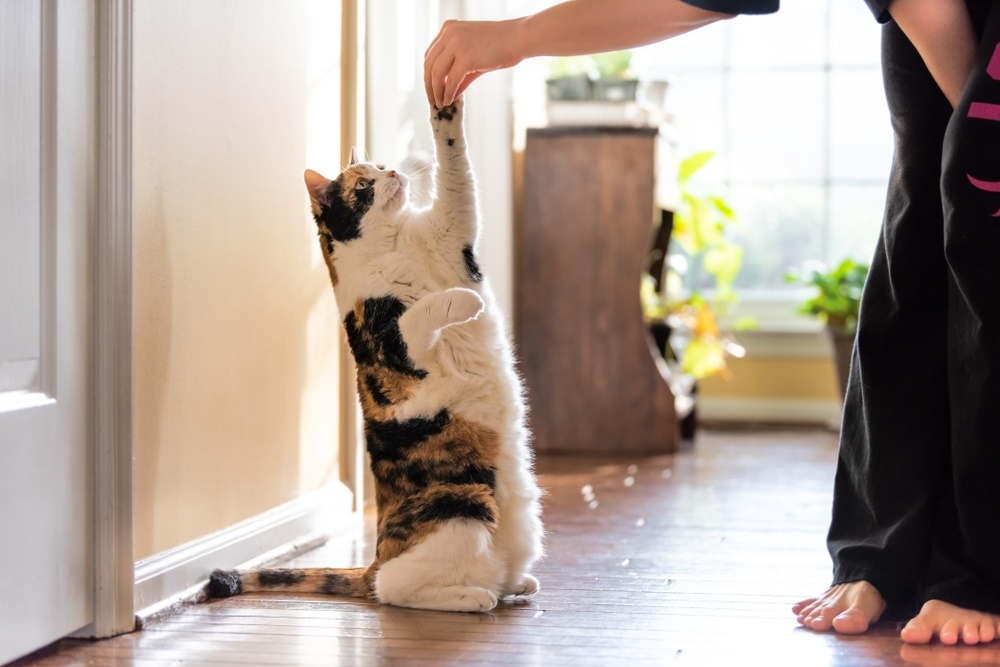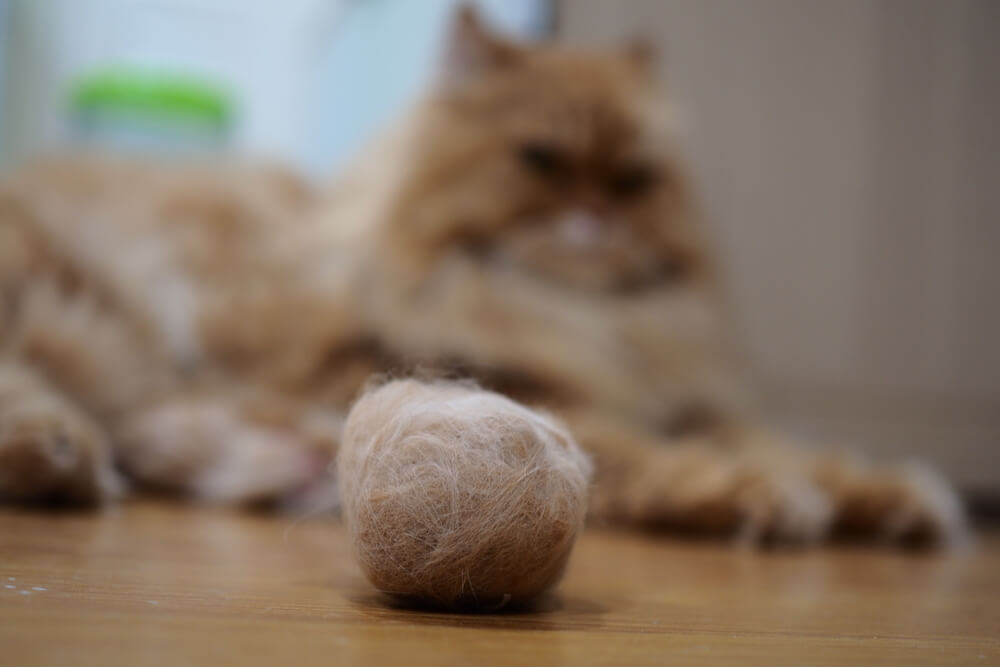Keeping Kitty Comfortable Exploring Hairball Control Treatments

How to Help Your Cat Pass a Hairball: 6 Vet-Approved Tips & Tricks
The information is current and up-to-date in accordance with the latest veterinarian research.
Learn moreMany cat owners think that hairballs are just a natural part of a cats life and that theres nothing that can be done about them.1 You may be surprised to learn that cats throwing up hairballs isnt actually normal. While their vomiting an occasional hairball isnt anything to worry about, its more natural for cats to pass hairballs when they poop.
When cat hair has a chance to build up in the stomach, it will eventually become too big and need to be removed. If cats regularly pass hair in their poop, they wont need to vomit big clumps of hair.
In this article, we look at six ways that you can help your cat pass a hairball when they poop, along with tips to help prevent hairballs in the future.

How to Help Your Cat Pass a Hairball
1. Change Their Feeding Schedule
Many cat owners feed their cats two large meals a day. This may not help their digestive systems work regularly. Feeding them smaller meals more frequently throughout the day can help the fur in their stomach be pushed into the intestines.
Take your cats daily food allotment and divide it into four to eight small meals throughout the day. Not only can this keep their digestive system working to remove more hair, but it can also help your cat maintain their weight, feel more satisfied, and have more energy. It has been shown that cats prefer to eat little and often, as this mimics feeding habits in the natural environment.

2. Change Their Food
Switch your cat to a food that is made for hairball control or digestive health. These foods have ingredients in them to help the hair move from the stomach through the digestive tract, so your cat can pass it when they poop. Regularly eating these foods can keep cats from vomiting hairballs regularly. Be sure to transition your cat to a new food properly to avoid stomach issues.
3. Add More Fiber
Adding more fiber to your cats diet will help them have an easier time passing hair through their intestines. Talk to your vet about which fiber supplements will be best to add to your cats food. You can also use canned pumpkin. One teaspoon a day can help give them the fiber that they need to pass the hair easily. Just make sure the pumpkin that you use is plain, pure pumpkin and not pumpkin pie filling, which has added sugar and spices that may be harmful to your cat.

4. Use a Hairball Lubricant
Hairball lubricant is a paste or gel that comes in enticing flavors. It lubricates the inside of the cats intestines to get the hair moving. Just put a dab of the lubricant on your cats paw, and they will lick it off. Talk to your vet before starting this routine to make sure its the best solution.
5. Give Your Cat Hairball Control Treats
Hairball control treats give your cat the ingredients necessary to pass hairballs without you having to change their regular food or use a messy gel. Even after your cat has passed the hairball, you can continue giving them these treats to prevent hairball buildup in the future.

6. Use Olive Oil or Fish Oil
Adding fish oil to your cats food can help them pass a hairball naturally. A teaspoon of oil every week should be enough to keep things moving. It also helps with coat conditions.

Preventing and Minimizing Hairballs in Cats
Now that you know how to help your cat pass hairballs, there are a few things that you can do to minimize them and prevent them from occurring. Its impossible to stop hairballs completely because cats swallow hair every time they groom themselves. But with these tips, you can slow their frequency and make them easier for your cat to deal with.
Brush your cat regularly. Your cat may self-groom every day, but the less hair they swallow means less of it will wind up in their stomach. Ideally, you should brush your cat weekly. Brushing daily is even better. The goal is to remove as much loose hair as you can. A bonus is that less hair winds up around your house, too.
Hepper Deshedding Cat Brush- ONE PUSH RELEASE - This kitten brush / cat brush pops out fur with just a simple press, leaving you...
- DURABLE - Cat shedding can be a tough ordeal. Made of resilient ABS plastic and metal bristles with...
- COMFORTABLE - A cat fur brush with 60 degree angled, fine bristles and rubber stoppers will bring...
Most cats do an excellent job of cleaning themselves, they will spend countless hours grooming themselves to get rid of loose fur. But with the Hepper Cat Brush, your cat will no longer need to spend their days grooming. The brush is designed to be gentle yet effective, removing loose hair and stubborn knots without any painful pulling. What better way to bond with your favorite feline? Click here to try it for yourself!
At Catster, weve admired Hepper for many years and decided to take a controlling ownership interest so that we could benefit from the outstanding designs of this cool cat company!
Increase your cats water intake. This is especially helpful if your cat only eats dry kibble. Cats dont normally drink as much water as they should. In addition to offering your cat a fresh, clean water source each day, try to encourage them to drink more. Use a water fountain that might interest them more than a regular bowl of water. You can also add water or broth to their food to give them more moisture. The proper amount of hydration will keep their digestive systems working well.

Conclusion
Hairballs dont have to be a regular part of your cats life. We hope that youve learned a few tips and tricks that you can start doing today to help your cat pass hairballs and be more comfortable. By following our suggestions for preventing hairballs, you can keep them from returning frequently. Remember to always monitor your cat for signs of changes in behavior. There could be a medical reason your cat is vomiting hairballs more frequently. If you notice anything strange, contact your vet right away. Be sure to talk to your vet before you make any changes to your cats diet too.
Featured Image Credit: Suzanne Tucker, Shutterstock
The 5 Best Hairball Remedies For Cats

Note: Veterinary review of this article includes only the medical information in this article. The veterinarian reviewing this article does not personally endorse, recommend, or vouch for the efficacy or claims of any product mentioned in this article.
The best hairball remedies do more than help hair slide through your cats body. They treat the problem at its root by supporting overall digestive health.
Thats why we chose Cat Lax as the best hairball remedy on the market. This well known hairball gel contains a blend of ingredients that break up hairballs, prevent new ones from forming, and minimize shedding to keep hairballs at bay.
Before we learn more about Cat Lax and our other top five picks, lets talk about the types of hairball remedies and how they can help.
At a Glance: Our Top Picks for Best Hairball Remedies for Cats
Want a quick look at the products reviewed in this article? In the comparison table below, weve highlighted some of the most important features of each product. Youll find more detailed information about each product later in the article.
Overall Best
9.9
Picked by 31 people today!
- Contains a blend of lubricants
- Most cats like the gels flavor
- Affordable
Runner Up
9.8
Picked by 31 people today!
- Over 1,600 customer reviews, 4.5 star rating
- Cats seem to enjoy the tuna flavor
- Helps lubricate ingested hairs to prevent hairballs
BEST FOR BUDGET
9.6
Picked by 25 people today!
- Rich in omega-3 fatty acids
- Controls hairballs while supporting digestive health
- Most cats like the way the gel tastes
BEST HAIRBALL PREVENTION SUPPLEMENT
9.4
Picked by 21 people today!
- Most reviews are positive
- Made from a blend of well-regarded ingredients
- Appears to be safe for cats
BEST HAIRBALL CONTROL TREAT
9.3
Picked by 18 people today!
- Contains fiber to help move hair through the GI tract
- Features prebiotics and probiotics for digestive health
- Free of potentially-harmful ingredients
Types of Hairball Remedies for Cats
Hairballs form when hair gets stuck or slowed on its way through the digestive tract, allowing it to form into a clump. Once it forms into a clod, hair is unable to continue its journey to the litter box and instead it gets stuck or heads in the opposite direction.
Hairball treatments come in many different forms. You can buy hairball remedies in a tube, try homemade remedies, grow a pot of cat grass, or groom your cat to keep him from ingesting his hair at all.
Some cats with frequent hairballs may have an underlying problem like inflammatory bowel disease (IBD) that affects motility of their intestines, so diagnosing and treating this could solve their problems.
Heres a quick breakdown of the types of hairball remedies available and how they work.
Fiber
Fiber supplementation helps to bind single strands of hair to food particles, which carry the hairs on their journey towards the colon. By encouraging the hair to move quickly through the body, fiber-based hairball remedies reduce the hairs chances of fusing into a ball and coming back up.
Additionally, a small amount of dietary fiber can help keep the digestive system functioning smoothly, correcting hairball problems at their roots.
Fiber-Based Hairball Remedies
The following are sources of fiber that, when integrated into your cats diet, may help hair move smoothly through the body.
- Psyllium Husk Powder
- Ground Chia Seeds
- Guar Gum
- Powdered Cellulose
- Cat Grass
Lubrication
The second type of hairball remedies includes products that lubricate ingested hairs, preventing them from sticking together.
Petrolatum (Petroleum Jelly)
Petrolatum, also known as petroleum jelly, paraffin oil, or white petrolatum, is a highly refined derivative of petroleum. After its been fully refined, petroleum jelly appears to be safe for cats and people.
If you decide to give your cat petroleum jelly from your medicine cabinet, check the back of the package to ensure that youre giving your cat 100% plain petroleum jelly with no scents or other additives.
Hairball Gels
Most products marketed as hairball remedies are petroleum jelly-based. Others use vegetable oils or beeswax instead of petrolatum. They contain added flavors and sweeteners like malt syrup, fructose, and dextrose.
Butter and Oil
Butter and olive oil are frequently recommended for hairball control, but as digestible fats, theyre more likely to make your cat chubby than keep him from hacking up a furball.
Mineral oil had previously been recommended for hairballs, but it carries the risk of aspiration (going down into the lungs) since it doesnt trigger a cough reflex.
Other Hairball Remedies
Egg yolks have interesting properties for hairball control. They contain choline and lecithin, which work together to, respectively, encourage GI contractions and emulsify the fat that binds hairballs together.
You can provide the anti-hairball power of egg yolks by feeding your cat fresh egg yolks or by giving him an egg yolk lecithin supplement. A safe and effective dose for lecithin has not been established for cats, and most supplements formulated for people contain much more than is present in hairball products for cats.
Slippery elm bark contains soluble fiber, which may help to soothe and lubricate the digestive tract, reducing inflammation and helping the hairball move in the right direction
Dietary Changes
Though hairball-specific cat foods usually focus on fiber alone, this isnt always the right approach.
If your cat is already eating a diet with a little bit of fiber, the best dietary change is finding a food that reduces inflammation. Hairballs often indicate digestive problems and should be approached the same way youd approach any other symptom of gut inflammation, like diarrhea or vomiting.
Typically, this would mean giving your cat a high-protein food made primarily from meat and animal fat. You want as little plant matter as possible. A moisture-rich diet is ideal.
Read Our Article On The Best Cat Food For Hairball Control
Grooming
Finally, you can control hairballs by brushing your cat a couple of times a week. If your cat has a long, thick coat, you might also give him a full-body clip in the warmer months. Capturing loose hair before your cat licks it up is the most reliable means of stopping hairballs.
Read Our Guide To The Best Cat Grooming Brushes
Top 5 Best Hairball Remedies Reviewed
The following hairball remedies are popular, top-rated products that have a reputation for safety and effectiveness. Most are lubricating products, but youll also find a few that take a different approach to hairball control, addressing it as a component of digestive health.
Ultimately, you dont want to have your cat on lubricants and other hairball treatments for the rest of his life. You dont want him to have hairballs.
The above hairball remedies can help, but theyre not a complete solution to the hairball problem.
If your cat coughs up hairballs more than a few times a year, his frequent hacking is probably connected to digestive problems. In this case, he probably doesnt need to be swept out with fiber or lubricated with greasehe might need to go to the veterinarian. Extremely frequent hairballs may be a symptom of organ dysfunction, IBD, and other conditions.
If you determine that your cats hairballs are caused by a digestive issue, you may want to consider treating the hairballs the same way youd treat any chronic digestive problem.
Adjust your cats diet to reduce inflammatory ingredients and consider incorporating probiotics, prebiotics, and omega-3 fatty acids to promote digestive health
Also Read: Best Cat Food for IBD









